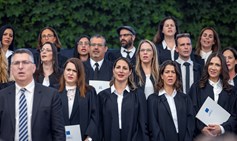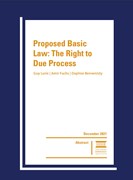

Publications Regarding Judiciary
Articles

Should the Court Manage the Draft of the Ultra-Orthodox?
Written By: Prof. Amichai Cohen
The government’s refusal to formulate an enforcement plan for drafting ultra-Orthodox men, in defiance of a ruling by the High Court of Justice, places Israel before an unprecedented crisis. The Court faces only bad options—but it may have no choice other than to step into the shoes of the executive branch and move toward active enforcement.

The Sde Teiman Crisis and the Assault on Israel’s Rule of Law
Written By: Prof. Amichai Cohen, Prof. Yuval Shany
The court’s ruling about who can oversee an obstruction of justice investigation into military officials has broad rule-of-law implications.

What is Missing from the Court's Decision on the MAG Leak Investigation
Written By: Prof. Suzie Navot
The High Court handed down a decision allowing the Minister of Justice choose the civil servant to oversee the investigation into the Sde Teiman video leak affair in the Attorney General's stead. This sets a concerning precedent and ignores the current political reality in Israel.

A Note to Members of Knesset: Immunity Does Not Apply to Police Investigations
Written By: Prof. Suzie Navot, Dr. Moran Kandelshtein-Haina
Though Members of Knesset are granted immunity from prosecution under the law, legal precedent makes clear that this immunity does not apply to the stage of criminal investigations.

The Case for Nuance and Complexity in Israel's Polarized Politics
Written By: Prof. Benjamin Porat
Now more than ever, Israelis must be empowered to form complex, non-sloganeering positions that may not fit superficially into existing frameworks. This is the key to breaking free from the simplistic, dichotomies and gridlock in which our discourse is trapped.

One Minister Wearing Five Hats
Written By: Prof. Suzie Navot, Dr. Moran Kandelshtein-Haina
With Justice Minister Yariv Levin's recent appointment as Acting Minister of Jerusalem and Jewish Heritage, he now holds five ministerial portfolios. This situation, with Levin and other ministers, is harmful to public interest and raises important legal and procedural questions.

The Polish Precedent for Preventing the Attorney General from Entering Her Office
Written By: Adv. Daphne Benvenisty
The Israeli Minister of Justice ordered the locks changed at the Tel Aviv office shared by the Attorney General, an action that blatantly violates the Supreme Court’s interim order prohibiting the dismissal of the Attorney General and any changes to the working arrangements between the government and the Attorney General.

Key points to keep in mind in relation to the Supreme Court hearing on Ronen Bar's firing
Written By: Prof. Suzie Navot
IDI VP of Research Prof. Suzie Navot shares key points to keep in mind in relation to the Supreme Court hearing on Ronen Bar's firing.

The Government Against the Rule of Law
Written By: Dr. Guy Lurie
The Israeli government's current efforts to dismiss the head of the director of the Shin Bet and the Attorney General, alongside its attempt to restructure the Judicial Selection Committee, reflect a broader shift toward subordinating legal and security institutions to political authority, raising concerns about the erosion of the rule of law and the future of democratic governance in Israel.

Israel’s Renewed Judicial Overhaul
Written By: Prof. Yuval Shany, Prof. Amichai Cohen
The battle over Israel’s legal system has resumed, threatening judicial independence.

The Dangerous Politicization of Judicial Appointments
Written By: Dr. Amir Fuchs
Changes in the composition of the Judicial Selection Committee threaten the independence of the judicial system. The current proposals would lead to a complete politicization of appointments to all courts and should be blocked.

What Happens When Israel’s Minister of Justice Refuses to Cooperate with the Chief Justice?
Written By: Dr. Guy Lurie
IDI's Dr. Guy Lurie explains the far-reaching implications of non-cooperation between the two leaders of Israel's judiciary.
"It's the everyday citizens who are sure to pay the price."

The Danger of a Politicized Judicial Selection Committee
Written By: Dr. Guy Lurie
Dr. Guy Lurie, a Research Fellow at IDI's Democratic Values and Institutions Program, offers a breakdown on the risks of politicization inherent in the recent proposal by Minister of Justice Levin and Foreign Minister Sa'ar to reform the Judicial Selection Committee.

Justice Minister: Won't Cooperate with New Supreme Court President | Dr. Guy Lurie on Kan English Podcast
Written By: Dr. Guy Lurie
Dr. Guy Lurie, Senior Researcher at the Israel Democracy Institute, speaks to KAN reporter Naomi Segal following the election of Justice Isaac Amit to Chief Justice and the Minister of Justice's statement that he does not recognize the appointment and will not cooperate with him.

The Politicization Revolution in Judicial Selection
Written By: Dr. Guy Lurie
The Sa'ar-Levin proposal represents a shift from prioritizing professional qualifications in the Judicial Selection Committee to emphasizing political loyalty as the basis for judicial appointments. This risks eroding judicial independence, compromising professionalism, and incentivizing ideological extremism.

“Democracy on the Frontlines” Conference Survey
Written By: The Israel Democracy Institute
Only a small minority of the Israeli public (8%) think that the judicial overhaul should be the government’s highest priority today; The majority of respondents (53%) support keeping the current structure of the Judicial Selection Committee. Only around a quarter (27%) suppor adding politicians to the Committee.

IDI Experts on the New Levin-Saar Proposal to Change the Judicial Selection Committee
Written By: Israel Democracy Institute
In a statement following publication of the new initiative released by Minister of Justice Yariv Levin and Foreign Minister Gideon Saar, IDI experts weigh in on the new proposal to change the Judicial Selection Committee.

Does the Minister of Justice Have Immunity?
Written By: Prof. Suzie Navot, Dr. Moran Kandelshtein-Haina
In response to a petition filed against him regarding the intentional delay in appointing a president of the Supreme Court, Minister Levin claimed that it is impossible to sanction him because he enjoys “substantive immunity.” A closer examination of the law reveals that this is not the case.

“If I am not the one deciding – then we will change the rules”
Written By: Prof. Suzie Navot
In September, the Supreme Court ordered the Minister to fulfill his duty to convene the Committee because the system cannot be paralyzed. Since then, the Minister has convened the committee, but refused to appoint the Supreme Court President. Now, the Court has ordered him to do so.

The International Criminal Court Issues Arrest Warrants Against Prime Minister Netanyahu and Former Defense Minister Yoav Gallant
Written By: Dr. Eran Shamir-Borer, Prof. Amichai Cohen
The ICC's unprecedented arrest warrants against leaders of a democratic state carry severe and far-reaching consequences, yet Israel still has far-reaching options to mitigate the damage.

Constitutional Crisis – Definitions, Precedents, Implications
Written By: Dr. Amir Fuchs, Adv. Daphne Benvenisty, Dr. Nadav Dagan
Recently, Israel has faced a number of situations that could lead to a constitutional crisis. What is a constitutional crisis and why is it dangerous for the stability of democracy? IDI experts explain.

Explainer: Appointment of the President of the Supreme Court
Written By: Dr. Guy Lurie
How is the Chief Justice in Israel selected, what is the principle of seniority and how does this compare internationally? Dr. Guy Lurie explains the roles and responsibilities of the Chief Justice, an issue that is currently at the heart of a dispute between the Minister of Justice and the Courts.

Understanding the Supreme Court's Ruling: Selection of the Supreme Court President
Written By: Dr. Guy Lurie
The Israeli Supreme Court recently issued a pivotal ruling, instructing the Minister of Justice to convene the Judicial Selection Committee and select a new President of the Supreme Court. This decision come after nearly a year in which this permanent position has remained vacant.

Appointing a President for the Supreme Court: Justice Levin's Actions Contravene the Law
Written By: Prof. Suzie Navot
After the Minister of Justice Yariv Levin refrained from convening the Judicial Selection Committee to appoint a Supreme Court President, the Supreme Court ruled that the Committee must convene to appoint a President—Prof. Suzie Navot analyzes the Court's decision.

Netanyahu and His Ministers Have Driven Israel to the Verge of a Constitutional Crisis
Written By: Dr. Amir Fuchs
Disregard of the Attorney General’s authority to interpret the law by several government ministers is leading Israel toward a constitutional crisis.

Judicial Selection in Israel in the Aftermath of the Judicial Overhaul
Written By: Dr. Guy Lurie
With the outbreak of the war in October 2024, the Prime Minister announced that he was halting all legislation relating to the judicial overhaul, however, various government actions raise questions regarding its intentions in relation to the overhaul and whether it might be trying to advance it by other means beyond legislation.

Advisory Opinion of the International Court of Justice on the Legal Consequences of Israel's Policies and Practices in the "Occupied Palestinian Territory"
Written By: Dr. Eran Shamir-Borer, Adv. Mirit Lavi
An in-depth analysis of the advisory opinion of the ICJ on the legal consequences of Israel's policies and practices in the 'occupied Palestinian territory.'

The United Nations’ Warning about Undermining the Independence of the Judiciary
Written By: Dr. Guy Lurie
The UN report paints a disturbing picture in which countries experience “autocratization”—an erosion of the foundations of democracy—through actions that undermine the judicial system’s independence. In Israel, the current government is aiming to undermine judicial independence in order to consolidate its power and authority at the expense of individual rights and the rule of law.

The Judicial Overhaul and Anti-Democratic Initiatives - Part II
Written By: Adv. Anat Thon Ashkenazy, Adv. Daphne Benvenisty
IDI experts outline the initiatives and measures undertaken by the government that, taken together, constitute a concentrated effort undermine Israel's democratic institutions. At the core of these efforts is a dramatic attempt to weaken the status of the Attorney General; increased politicization of the police; continued undermining of the independence of the judiciary and more.

A Sharp, Unequivocal, and Unanimous Supreme Court Decision to Draft Haredim
Written By: Prof. Suzie Navot
The Supreme Court ruling on June 25th addresses the question of whether the government is operating in accordance with the law. It determined that the state must act in accordance with the law and act to draft ultra-Orthodox. It also connects between the issue of exemptions and the criteria for eligibility for yeshiva budget funds.

Netanyahu Government Gets Low Grades Across Various Wartime Issues
Written By: Prof. Tamar Hermann, Dr. Lior Yohanani, Yaron Kaplan
Across the issues of US-relations, the war in Gaza, evacuees from the south and the north, fighting Hezbollah, and public diplomacy efforts abroad—both Jewish and Arab Israelis give the government low grades.

Haredi Enlistment According to the Supreme Court Justices: "We intend to decide"
Written By: Prof. Suzie Navot
The discussion in the Supreme Court yesterday was not about whether a law exempting yeshiva students harms the principle of equality. It was about a much more basic question: is the State of Israel acting in accordance with the principle of the rule of law—that is, can yeshiva students be exempted from enlisting in the IDF, when there is no law allowing for this.

A Historic Supreme Court Hearing on Haredi Conscription and Yeshiva Funding
Written By: Adv. Shlomit Ravitsky Tur-Paz
Israel's Supreme Court convened to hear arguments on the issue of drafting ultra-Orthodox yeshiva students who no longer are exempt from military service, and the legality of providing funding for yeshivas that enroll them as long as no new law has been legislated on this issue.

What Constitutes Professional Judicial Conduct? Barak’s Lesson to the ICJ Judges
Written By: Prof. Suzie Navot
The International Court of Justice in The Hague (ICJ) issued new temporary orders against Israel this week. Justice Barak’s dissenting opinion would seem to offer an important lesson for the future. Professional, focused, and well-founded legal criticism—as opposed to the very different means that are currently being widely discussed and pursued—is likely the best way to deal with the ICJ.

Economic Implications of Drafting Ultra-Orthodox in Israel
Written By: Gabriel Gordon
In new research, IDI experts Shlomit Ravitsky Tur-Paz and Gabi Gordon find that conscripting even a small percentage of eligible Haredi men would save the Israeli economy billions of shekels annually. They found that drafting even 20% of Haredi men would significantly reduce the number of days necessary for reserve duty and save 2.5 billion shekels in budgetary expenses by 2050. Full conscription of the ultra-Orthodox men would eliminate the need for reserve duty by 2045 and save the Israeli economy between 8-10 billion shekels.
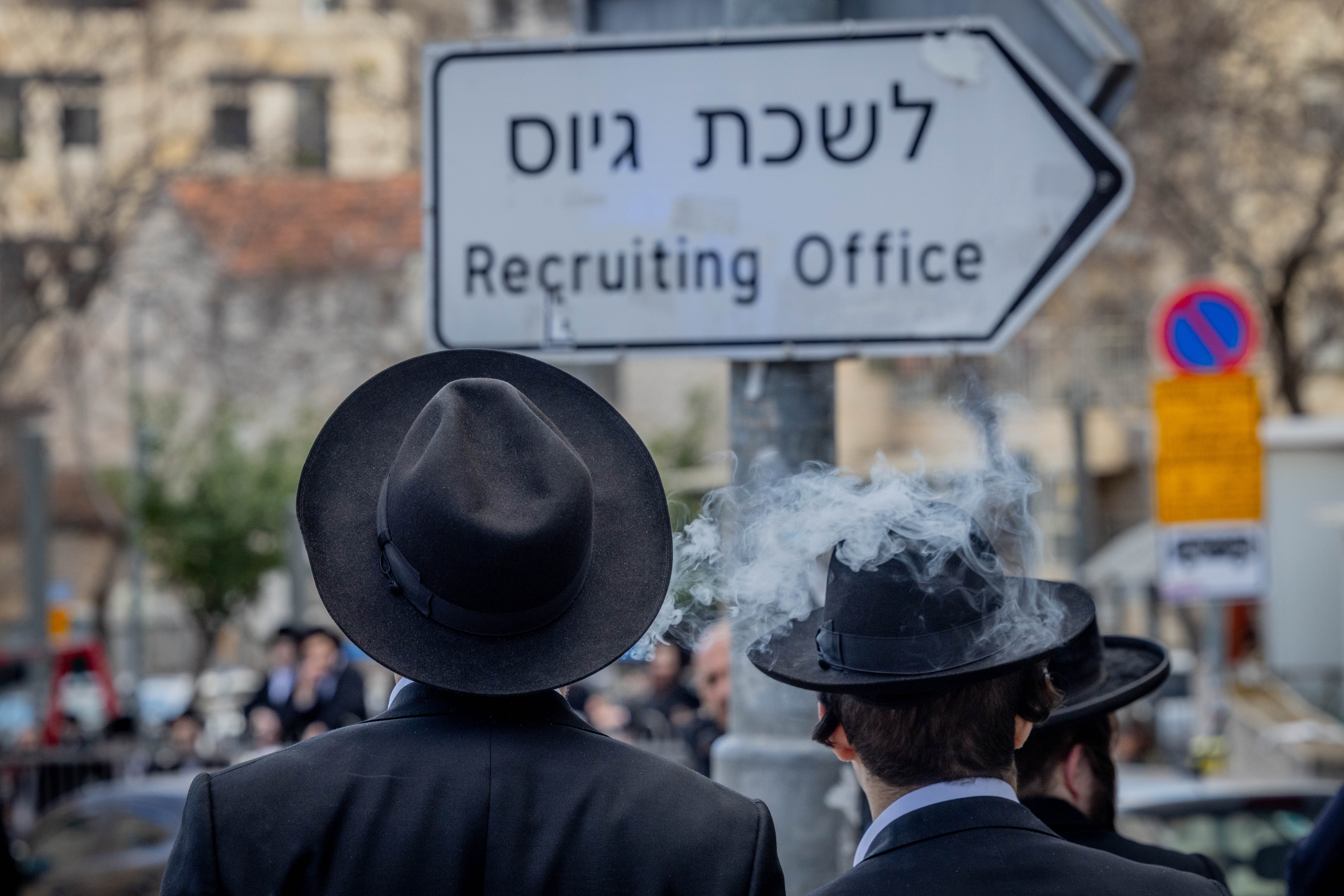
Response to the Government's Proposal for Haredi (non-) Conscription
Written By: Yohanan Plesner , Dr. Gilad Malach
Response to the Government's Proposal for Haredi (non-) Conscription by Yohanan Plesner, President of the Israel Democracy Institute, and Dr. Gilad Malach, Head of IDI's Ultra-Orthodox in Israel Program

The Invisible Safeguards of Judicial Independence in the Israeli Judiciary
Written By: Dr. Guy Lurie
The Israeli democracy regulates the operation of the judiciary through the constraints of formal rules that check the political actors, the individual judges, and the judiciary. Yet beyond these formal rules, informal institutions and practices are sometimes equally important in the operation of the judiciary, as they are in any constitutional system. This article discusses informal institutions that are important in the operation and independence of the Israeli judiciary.
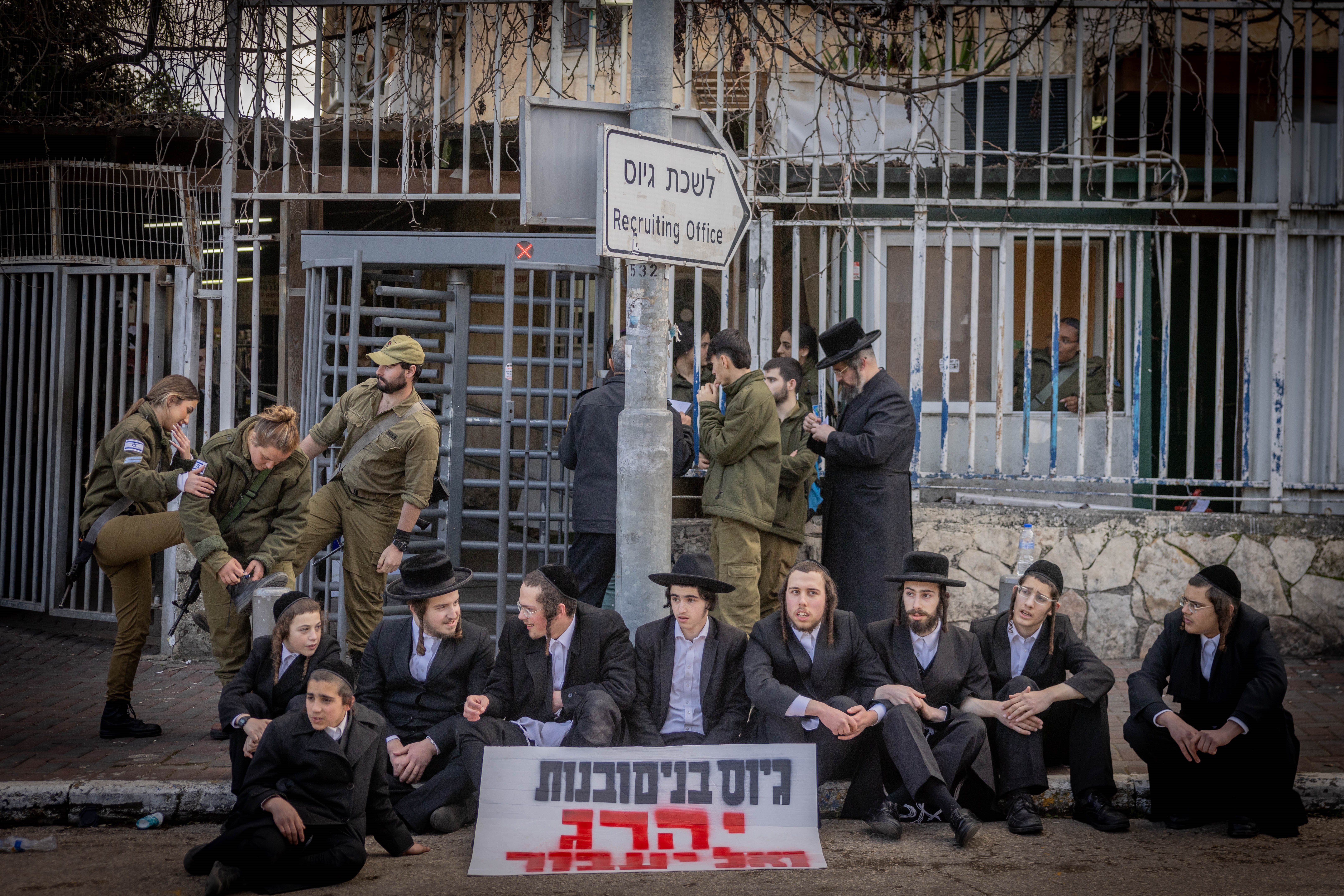
Explainer: The Supreme Court hearing on (non) recruitment of ultra-Orthodox men and budgeting of yeshivas
Written By: Adv. Shlomit Ravitsky Tur-Paz
What is the connection between the expiration of the conscription law and the budgets for yeshivas? What exactly was discussed in the Supreme Court and is the state in violation of the law? Bottom line, will the ultra-Orthodox be recruited, or not?
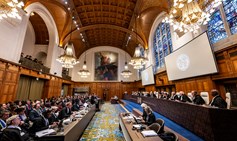
Statement on the ICJ Decision On Provisional Measures
Written By: Prof. Amichai Cohen
Prof. Amichai Cohen, a senior fellow at the Israel Democracy Institute and an expert in international law, made the following comments on the International Court of Justice (ICJ) decision today regarding provisional measures in the case of South Africa v. Israel on the Application of the Genocide Convention.
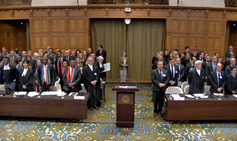
South Africa vs. Israel at the International Court of Justice: A Battle Over Issue-Framing and the Request to Suspend the War
Written By: Prof. Amichai Cohen, Prof. Yuval Shany
The International Court of Justice (ICJ) at the Hague held public hearings in the case against Israel for alleged violations of the Genocide Convention. In this essay we address three aspects of the case: the ways the parties framed the events, the request to suspend Israeli military operations, and the conditions for issuing provisional measures.
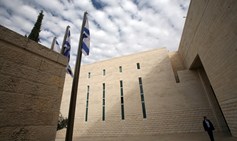
The HCJ Strikes Back: Israel’s Supreme Court Pulls the Plug on “Judicial Reform”
Written By: Prof. Amichai Cohen, Prof. Yuval Shany
Two judgments issued by the Supreme Court in the first week of 2024 deal a decisive blow to the Netanyahu government’s efforts to radically rebalance the branches of government.
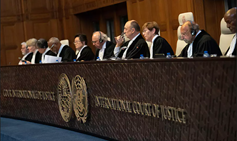
International Court of Justice in The Hague Genocide Proceedings -
Written By: Adv. Shlomit Ravitsky Tur-Paz
One of the claims brought forth in the Application against Israel that it is committing genocide against the Palestinians is that many senior members of the government made references to the biblical precept to wipe out the memory of the ancient Amaleks. This is my professional opinion on the meaning of these locutions and the use made of them in the Application.
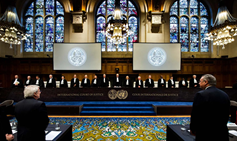
The ICJ Hearings on Israel and the War on Hamas
On January 11th, the court will begin by hearing South Africa’s oral argument, with Israel presenting its counter argument on January 12th.
What does the international law state and what are the possible implications of these proceedings on the ongoing war and Israel’s international standing? We’ve compiled a shortlist of important information you should have.

What Was the Supreme Court’s Ruling on the Revocation of the Reasonableness Doctrine? Eight Key Points
Written By: Prof. Amichai Cohen, Dr. Amir Fuchs, Dr. Guy Lurie
The Supreme Court's ruling to strike down the amendment made to the Basic Law: The Judiciary and reinstate the Standard of Reasonableness is a landmark decision on an issue that has been exceptionally divisive within Israeli society. Will this lead to a constitutional crisis? 8 Key points from IDI's experts examining the court's decision.
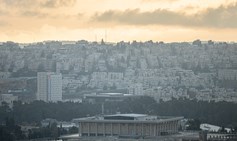
The Verdict is in: Checks and Balances are Here to Stay
Written By: Prof. Suzie Navot
This decision refocused our attention not only on the specific law it struck down but also on the unfinished business of completing our country’s constitutional framework
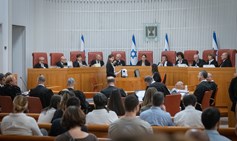
The Supreme Court Ruling on Canceling the Reasonableness Clause—Implications
Written By: Dr. Amir Fuchs
The Supreme Court ruled that the Court has authority to perform judicial review on Basic Laws, and that an intervention was necessary in the case of the amendment to the Basic Law: The Judiciary revoking the Standard of Reasonableness. What are the implications?

Selective Use of Facts and the Gaza Genocide Debate
Written By: Prof. Yuval Shany, Prof. Amichai Cohen
The recent application by South Africa to the International Court of Justice brought against Israel under the Genocide Convention illuminates how international law and international institutions can be employed to address the Israel-Hamas war.

Israel Democracy Institute Statement on Israel's Supreme Court Ruling
The Israel Democracy Institute issued the following statement on the High Court of Justice’s decision to strike down the amendment passed in July to the Basic Law: The Judiciary, eliminating the Court’s use of the Reasonableness Standard.
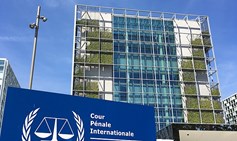
International Law "Made In Israel" Vs. International Law "Made For Israel"
Written By: Prof. Amichai Cohen, Prof. Yuval Shany
Tendentious interpretations of international law are not surprising considering the high emotions surrounding the long and bloody Israeli-Palestinian conflict. However, to serve its purpose guiding the conduct of States and retain a high degree of legitimacy, international law must serve as a common legal language.
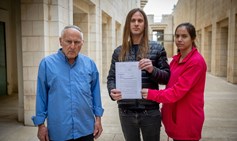
Does the High Court of Justice Intervene in Decisions to Release Prisoners?
Written By: Dr. Moran Kandelshtein-Haina
Appeals to the HCJ to intervene in decisions relating to the release of prisoners are fairly common, but the Court has repeatedly rejected these appeals, noting that on issues of national defense and diplomacy, the bounds for judicial oversight are particularly narrow.

The Justice Minister’s Decision to Convene the Judicial Selection Committee
Written By: Dr. Guy Lurie
On November 5, 2023, Minister of Justice Yariv Levin notified the High Court of Justice that he will convene the Judicial Selection Committee within 15 days. Selecting judges is not possible in such a short time frame, so we will have to wait and see whether this decision leads to the completion of judge appointments to the vacant positions.
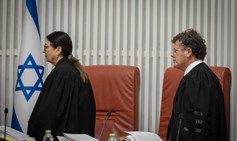
Israel needs a strong supreme court now more than ever
Written By: Dr. Guy Lurie
Justice Hayut's retirement from the presidency of the Supreme Court was well-known in advance, however, the Minister of Justice's refusal to convene the Judicial Selection Committee leaves Israel with a temporary replacement during a national emergency.

Special State of Emergency in Israel’s Court System
Written By: Dr. Guy Lurie
What is a special state of emergency and who declares it?
Minister of Justice Levin declared a "special state of emergency" on October 7th, which has since been extended and is currently valid until October 20th. How does this affect the justice system in Israel?

The Supreme Court Hearing on Reasonableness: Law without Enforcement
Written By: Prof. Suzie Navot
On the question of Unreasonableness, it appears that the dispute is not only between the Knesset and the Supreme Court, but also among the justices themselves. There are many possibilities, but only one ruling, which will be handed down no later than mid-January 2024.
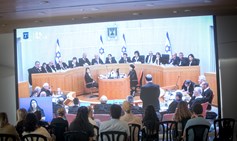
Three Big Cases in Israel's September to Remember
Written By: Prof. Amichai Cohen, Prof. Yuval Shany
Three petitions before the Israeli Supreme Court are transforming the usually slow month of September into a pivotal one in Israel’s ongoing judicial crisis.
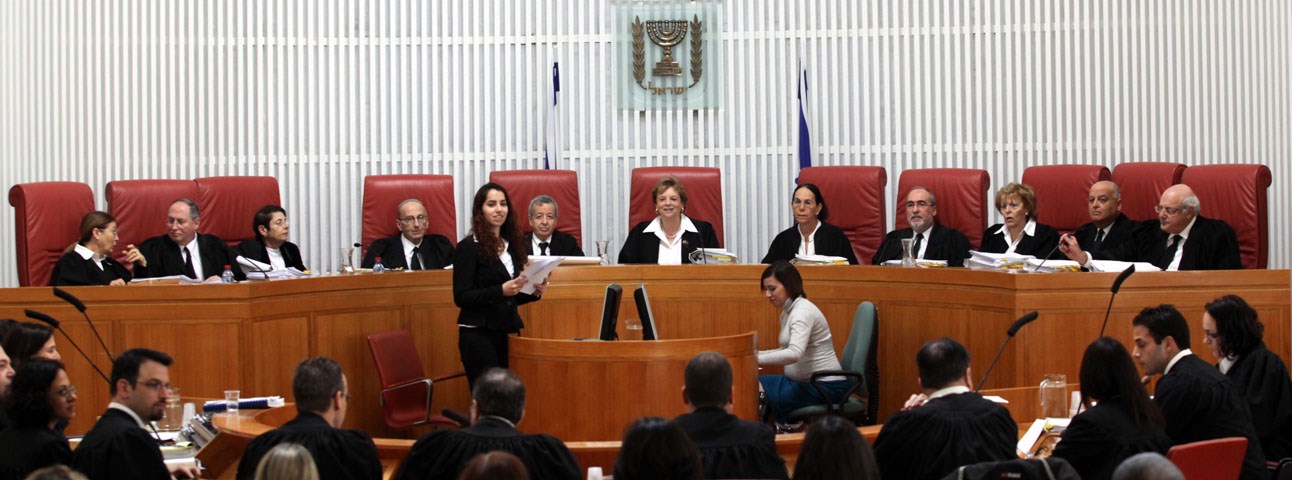
The Supreme Court Hearing on the Revocation of the Reasonableness Doctrine
Written By: Prof. Amichai Cohen
On September 12, 2023, an unprecedented panel of 15 Supreme Court Justices will convene to hear petitions requesting to strike down the recent amendment to the "Basic Law: The Judiciary."

The Judicial Selection Committee must be convened now
Written By: Dr. Guy Lurie
The Judicial Selection Committee has not met for more than a year, and during this period, various positions held by judges have been vacated.
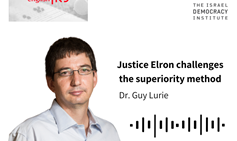
Justice Yosef Elron challenges the superiority method
Written By: Dr. Guy Lurie
IDI expert Dr. Guy Lurie met with KAN's Mark Weiss to discuss Supreme Court Justice Yosef Elron's announcement that he would seek election as the next Supreme Court president, a decision that flies in the face of the "seniority method" that has been used to select the court's president to date.

Why are Liberal Israelis so Terrified of Bibi’s Judicial Reforms?
Written By: Prof. Amichai Cohen
The proposed legislation evicerates the only check on executive and legislative power in Israel.

Israeli Gov't Depends on Citizens Voluntarily Cooperating
Written By: Prof. Yuval Feldman
Coercive regulations and enforcement, especially in democratic countries, have a more limited reach than governments are prepared to admit.
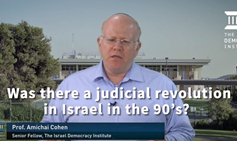
The Development of Israel's Judicial System
Written By: Prof. Amichai Cohen

How Israeli Judges Are Appointed: Questions and Answers
Written By: Dr. Guy Lurie
Why it is a bad idea to allow the coalition the deciding voice in the appointment of Supreme Court justices? Is it true that in Israel, judges appoint themselves? The complete guide to the impending constitutional reform.

61 Cats Guarding the Cream
Written By: Dr. Amir Fuchs
The optimistic hope that the majority will not take advantage of its power to perpetuate its rule is akin to leaving the cream to be guarded by 61 cats. The temptation is just too strong.

Judicial Reform
Written By: Prof. Suzie Navot
Prof. Suzie Navot sits down with Richard Pater of Bicom, to discuss judicial reform. Prof. Navot explains the background of Israel’s legal system, its uniqueness among other parliamentary democracies and the significance of potentially implementing an override clause.
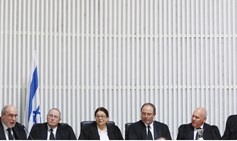
Terms of Office of Supreme Court Justices
Written By: Dr. Guy Lurie
In Israel, judges sit on the bench until they reach the age of 70, while advocates for changing the current method of their appointment often support the idea of limiting Supreme Court judges’ tenure.

The Tenure on the Bench of Supreme Court Justices
Written By: Dr. Guy Lurie
Among assertions that a limited tenure for justices would prevent excessive influence by past governments on the current composition of the Supreme Court bench and allow the current government to replace a larger number of justices - what is the average tenure of Israeli Supreme Court justices?
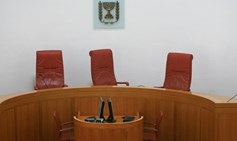
Trust is on the Wane
Written By: Dr. Guy Lurie
Despite a decline in trust - the public still believes that in the Court’s role as a professional independent entity and guardian of democratic principles.

One Arab Justice Isn’t Enough
Written By: Dr. Guy Lurie
The imminent retirement of Judge Kara will leave the Supreme Court without an Arab justice, yet there is only one Arab candidate on the list of possible replacements. We must move beyond filling the "Arab chair" and ensure proportional representation of Arabs as well as women and Mizrahim in the courts
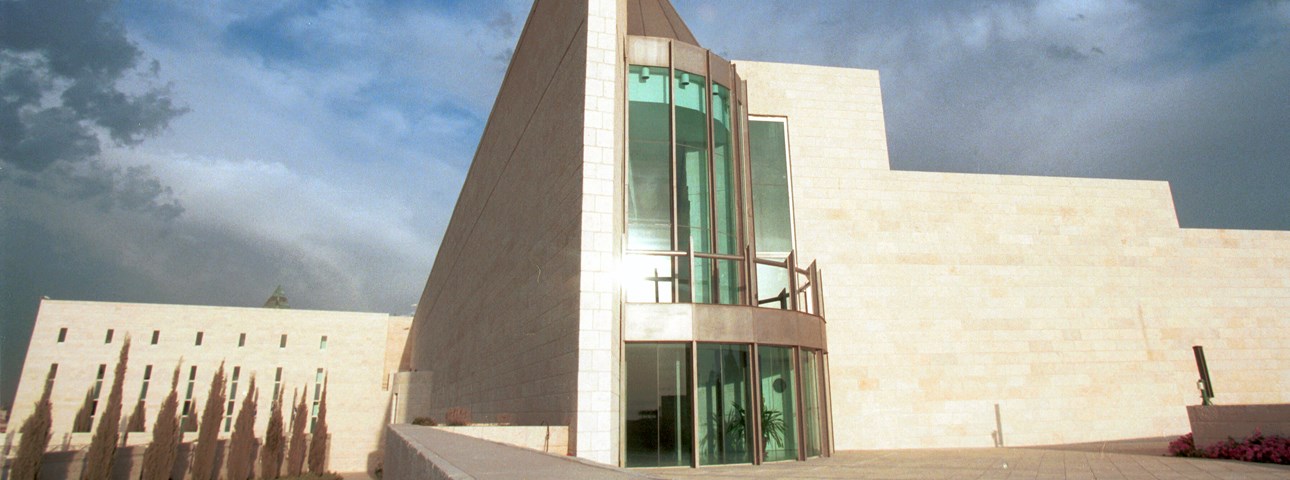
How Revolutionary Was Israel’s ‘Constitutional Revolution’?
Written By: Prof. Amichai Cohen
Prof. Amichai Cohen discusses his new book The Constitutional Revolution and Counter-Revolution, and explains the changing role of the High Court of Justice in maintaining the checks and balances of Israeli democracy.

Why is Public Trust in the Supreme Court Falling?
Written By: Dr. Nadiv Mordechay
In an age of waning trust in state institutions and an ongoing health and democratic crisis, the public must be able to look towards the courts as a staunch defender of human rights and democratic structure.

The Return to Balfour: Israel’s Supreme Court Strikes Down Coronavirus Regulations Curbing the Right to Protest
Written By: Prof. Yuval Shany
The latest judgement in a series of legal challenges to controversial measures adopted by the Israeli government in response to COVID, shows that the Supreme Court still plays an important role in checking government excess and reaffirming basic democratic and human rights values

On Democracy and the War against the High Court
Written By: Prof. Amichai Cohen
Elections are an attempt, not always successful, to translate the voters’ wishes into a well-functioning and representative government - however no democracy anywhere in the world makes do with elections to a single institution as the only means for implementing democracy
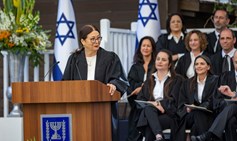
IDI Scholars Respond to Bill to Cancel Supreme Court Seniority System
The Israel Democracy Institute responded Thursday to the proposed bill to cancel the seniority system and deferral of deliberations on choosing Esther Hayut as the president of the Supreme Court, saying such steps harm the basic principles of the work of the judicial branch.

What these Conservative Supreme Court Justices Won’t Do
Written By: Prof. Yedidia Z. Stern
The four new Judicial Appointments Committee selections to the Supreme Court last month have led to the usual partisan responses, breaking down along the lines of “winners” and “losers.” Despondent claims of an “anti-constitutional revolution” are being made simultaneously with celebratory assertions of “making history.” The facts, however, are quite different.

Israel’s Agreement with Turkey: Does it Protect IDF Soldiers from Prosecution?
Written By: Prof. Amichai Cohen, Adv. Tal Mimran
Prime Minister Benjamin Netanyahu announced recently that Israel and Turkey had reached an agreement leading to reconciliation between the two countries – and the Knesset approved the deal. Now the question becomes: will the deal have the impact Israeli soldiers are hoping for? Originally published by the Jerusalem Post.

High Court Seems to Think That Only Arabs Need Deterrence
Written By: Dr. Amir Fuchs
The Israeli High Court's claim that home demolitions need not be applied to Jews because they support terror less than Palestinians must be rejected. (This article was originally published by Haaretz.)
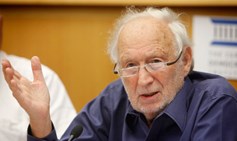
The Passing of Supreme Court Deputy President Mishael Cheshin: A Loss to the People and State of Israel
Written By: Prof. Yedidia Z. Stern
IDI Vice President Prof. Mordechai Kremnitzer remembers Israeli Supreme Court Deputy President Mishael Cheshin, a luminary of the Israeli judicial system and warrior against governmental corruption, who regularly spent time at IDI and whose clear voice on legal issues will be sorely missed.
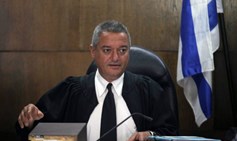
Appointing Arab Judges to the Courts in Israel
Written By: Dr. Guy Lurie
In an article in Mishpat U'Mimshal, IDI researcher Dr. Guy Lurie addresses the issue of the lack of Arab judges in Israeli courts. This abstract presents the main issues discussed in the article.

The Firing of Ministers in Israel: A Historical Overview
Written By: Prof. Ofer Kenig
The demise of the 19th Knesset was hastened by Prime Minister Benjamin Netanyahu's firing of Finance Minister Yair Lapid and Justice Minister Tzipi Livni. In the article below, IDI researcher Dr. Ofer Kenig discusses the various grounds for firing ministers in the past and how the current case fits into Israeli political practice.
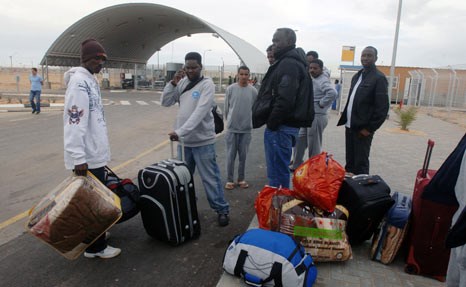
Detention of African Asylum Seekers in Israel: Welcome to Round Three
Written By: Prof. Reuven (Ruvi) Ziegler
On December 8, 2014, just before the Knesset dissolved itself to prepare for early elections, it enacted the Law for Prevention of Infiltration and Ensuring the Departure of Infiltrators from Israel. IDI's Dr. Reuven (Ruvi) Ziegler reviews this development.
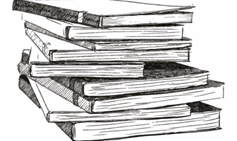
Legal Opinion on the "Zoabi Bill"
Written By: Prof. Mordechai Kremnitzer, Dr. Amir Fuchs
A summary of a legal opinion on a proposed amendment to Basic Law: The Knesset that was submitted by Prof. Mordechai Kremnitzer and Dr. Amir Fuchs to the Ministerial Committee on Legislative Affairs.

Adviser or Prosecutor? Israel's Attorney General Can't be Both
Written By: Prof. Yedidia Z. Stern
IDI Vice President Yedidia Stern asserts that there is a conflict of interest between the Attorney General’s two functions—as State Attorney and State Prosecutor—and the office must be split in two.
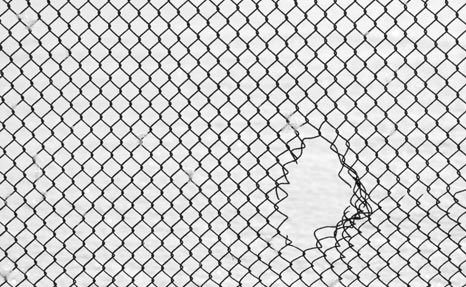
Overriding the Supreme Court: A Breach in the Wall of Democracy
Written By: Dr. Amir Fuchs
Dr. Amir Fuchs discusses the proposal to add an override clause to Israel's Basic Law: Human Dignity and Freedom that would enable the Knesset to bypass the High Court and deal a a severe blow to the main safeguard of human rights and minorities in Israel.
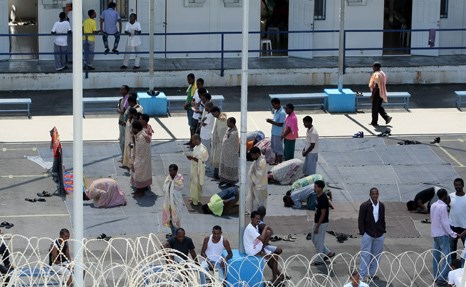
Second Strike and You Are (Finally) Out? The Quashing of the Prevention of Infiltration Law (Amendment No. 4)
Written By: Prof. Reuven (Ruvi) Ziegler
IDI Researcher Dr. Reuven (Ruvi) Ziegler presents a brief overview of the Israeli High Court of Justice's decision to strike down Amendment No. 4 of the Prevention of Infiltration Law, and explores several themes that may be of comparative constitutional interest.

The Admissions Committees Ruling: A Lack of Ripeness or Refusal to Decide?
Written By: Dr. Amir Fuchs
Dr. Amir Fuchs discusses the Israeli High Court of Justice's decision to uphold the "Admissions Committees Law," which allows small communities to reject applicants due to a lack of social suitability.
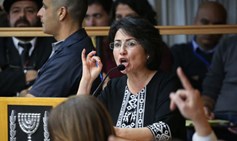
Heart vs. Head: The Case of Hanin Zoabi
Written By: Prof. Mordechai Kremnitzer, Admiral (Res.) Amichay (Ami) Ayalon
Prof. Mordechai Kremnitzer and Admiral Ami Ayalon argue that while the heart has difficulty defending MK Hanin Zoabi's freedom of expression, the head demands that we object to the decision to remove her from parliamentary activity for six months.

John Doe v. Jane Doe: Several Comments on the Privacy Revolution of Noam Solberg
Written By: Dr. Tehilla Shwartz Altshuler
IDI Researcher Dr. Tehilla Shwartz Altshuler analyzes a Supreme Court ruling that recalled a book and struck a balance between the right to privacy and the right to freedom of expression, and discusses larger questions of privacy in the digital age.
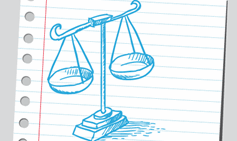
Censorship, Gag Orders, Military Censor, Media
Written By: Prof. Mordechai Kremnitzer, Dr. Amir Fuchs
Prof. Mordechai Kremnitzer and Attorney Amir Fuchs assert that the only way to guarantee Israel's existence as a Jewish and democratic state is not through a Basic Law that defining Israel as the nation state of the Jewish people but through a Constitution.
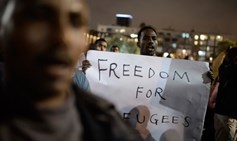
The Prevention of Infiltration Act in the Supreme Court: Round Two
Written By: Prof. Reuven (Ruvi) Ziegler
IDI researcher Dr. Reuven (Ruvi) Ziegler explains why he believes the Supreme Court should overturn Amendment No. 4 of the Prevention of Infiltration Act just as it invalidated its predecessor.

Is "Israeli" a Nationality?
Written By: Jay Ruderman, Prof. Yedidia Z. Stern
Should the State of Israel recognize "Israeli" as a nationality? IDI Vice President Prof. Yedidia Stern and Jay Ruderman assert that it is imperative for the State of Israel to continue distinguishing between citizenship and nationality.

The Case of Jonathan Pollard: A Legal Analysis
Written By: Prof. Mordechai Kremnitzer
In an op-ed in The Jerusalem Post, IDI Vice President Prof. Mordechai Kremnitzer analyzes Jonathan Pollard's life sentence and calls on President Obama to put an end to Pollard's incarceration In the name of the shared commitment to justice.
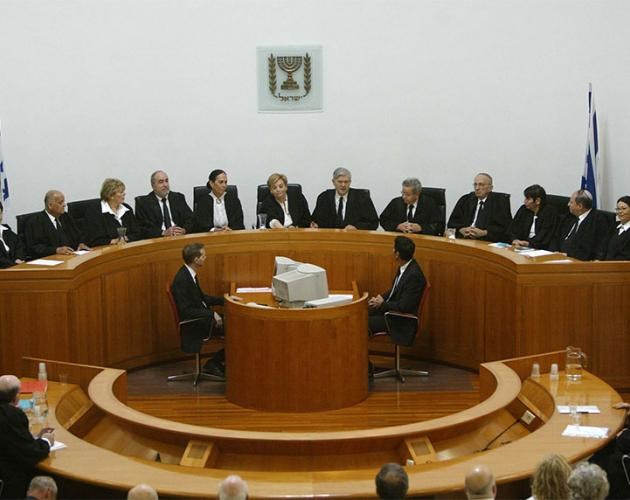
The Haredi Draft: Is the Shaked Committee's Bill Destined to be Overturned?
Written By: Prof. Yedidia Z. Stern
As the Shaked Committee begins to vote on its proposal for the Haredi draft, Prof. Yedidia Z. Stern warns that the proposal's recommendation to exempt Haredi men of draft age during a three-year "adjustment period" is both inequitable and ineffective.

A Truly Supreme Court
Written By: Prof. Mordechai Kremnitzer, Dr. Guy Lurie
In an op-ed in TheMarker, IDI Vice President Prof. Mordechai Kremnitzer and Dr. Guy Lurie discuss the benefits of establishing a new appellate court between the district courts and the Supreme Court.
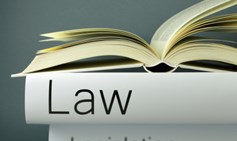
Separating the Prosecution from the Police
Written By: Prof. Mordechai Kremnitzer, Dr. Guy Lurie
Most criminal cases in Israel are prosecuted by the Israel Police rather than by the State Prosecutor. Prof. Mordechai Kremnitzer and Dr. Guy Lurie call for a division that would make the Police responsible for investigations and the State Prosecutor responsible for indictments and trials.
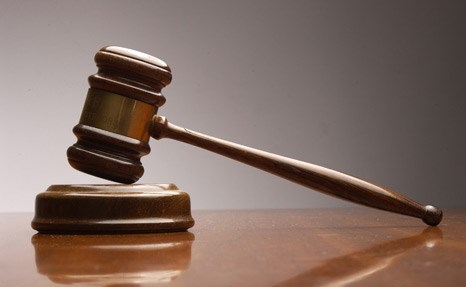
What Can We Learn about Israeli Policy Making from the Supreme Court's Ruling on the Anti-Infiltration Law?
Written By: Dr. Talya Steiner
Attorney Talya Steiner warns that a Supreme Court's judgment that struck down an amendment of Israel's anti-infiltration law as unconstitutional points to significant flaws in Israel's process of policy-making.

Quashing Legislation Mandating Lengthy Detention of Asylum-Seekers
Written By: Prof. Reuven (Ruvi) Ziegler
Dr. Reuven (Ruvi) Ziegler shares observations on the decision of the Israeli Supreme Court that an amendment of the Prevention of Infiltration Law that mandated lengthy detention of asylum seekers is unconstitutional.

The Tal Law: Judicial Responsibility at its Best
Written By: Prof. Mordechai Kremnitzer
Prof. Mordechai Kremnitzer presents a contrasting view to Prof. Yedidia Stern's assertion that the Israeli Supreme Court's ruling on the exemption of ultra-Orthodox men from military service in Israel is "<a href="http://en.idi.org.il/analysis/articles/judicial-activism-at-its-height">Judicial Activism at its Height</a>."

Basic Law: Legislation – A Lethal Blow to the Supreme Court
Written By: Prof. Mordechai Kremnitzer, Dr. Amir Fuchs
IDI Vice President Prof. Mordechai Kremnitzer and Adv. Amir Fuchs analyze the proposed legislation that would allow the Knesset to reinstate laws that have been struck down by the Israeli High Court and warn of a threat to judicial review and civil liberties.
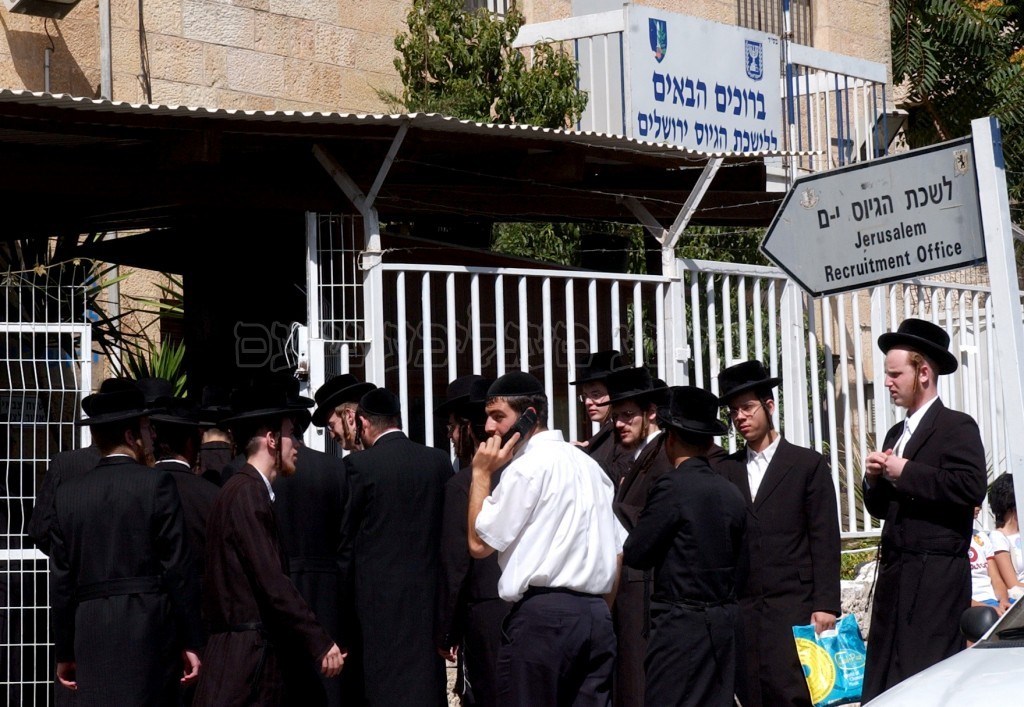
If They Give, They Will Receive
Written By: Yair Sheleg
In this response to the Supreme Court ruling on the Tal Law, IDI Senior Researcher Yair Sheleg asserts that the exemption of ultra-Orthodox men from military service is an unparalleled <em>Hillul Hashem</em>—a desecration of the Name of God, and shares his views of a possible solution.

Make the Ultra-Orthodox Serve
Written By: Yair Sheleg
IDI Vice President of Research Prof. Yedidia Stern sets the controversy over mass transportation on Shabbat and holidays in Israel in a broader context, and distinguished between the need for an Israeli-Jewish Shabbat (Sabbath) rather than a religious Shabbat.

Choosing between the Law and Torah
Written By: Jonah Mandel
Is the tension over the arrests of Rabbis Dov Lior and Ya’acov Yosef a precursor to an inevitable collision between Halakha and the judiciary? IDI Vice President of Research Prof. Yedidia Stern shared his views on this question with Jonah Mandel of The Jerusalem Post.

Decade in Review: A Rocky Road for Israeli Courts
Written By: Prof. Yedidia Z. Stern
IDI Vice President Prof. Yedidia Stern dissects the tenuous road traveled by the Israeli court system, in an article that was published at the end of the third millennium as part of a collaboration between IDI and Walla!, a popular Israeli website.

Minister of Justice Friedman vs. The Judicial System
Written By: Prof. Mordechai Kremnitzer, Yael Cohen
Last week, the Justice Minister proposed a bill aimed at separating the duties of the Attorney General from those of the Public Prosecutor. Prof. Mordechai Kremnitzer writes that Friedman's several attempts to introduce changes to the judicial system should be seen for what they are: a part of his larger agenda of weakening the judicial system.

Attempts to Undermine the Justice System Have Now Reached the IDF
Written By: Dr. Eran Shamir-Borer
A bill that would subordinate the professional work of IDF's highest legal authority to the IDF Chief of Staff, rather than the Attorney General, would have grave consequences for the rule of law, the IDF, and all who serve in it.

The Levin-Sa’ar Plan: Don’t Slam the Door on Someone Looking for a Way Out of Their Own Mess
Written By: Prof. Benjamin Porat
The Levin-Saar plan abandons key elements of his earlier judicial overhaul, proposing changes to judicial selection and Basic Laws. While flawed, it offers a potential starting point for bipartisan negotiations to resolve Israel’s constitutional crisis.
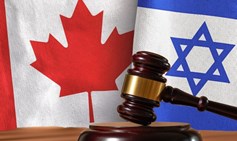
The Override Clause—Canada and Israel
Written By: Prof. Tsvi Kahana
Democracies ensrhine onstitutional rights, and give the court the power to protect them, out of concern that the legislator may act rashly, or even tyrannically - so then why should we "override" the court's authority - when we have no other constraints

A Prime Minister Under Criminal Investigation
Written By: Prof. Ofer Kenig, Dr. Guy Lurie
A summary of where the law stands regarding alleged wrong doing by the premier, as well as timely suggestions for reform, are in order.

Pardon Requests in Cases Brought Before Israeli Military Courts: How Do They Work?
Written By: Colonel (Res.) Dr. Liron A. Libman
Even before the conclusion of the Elor Azaria trial, there were calls for the 'Hebron Shooter' to be pardoned. Under such circumstances, what does a pardon entail and how can an IDF soldier who had been sentenced in a military court of law be granted one?
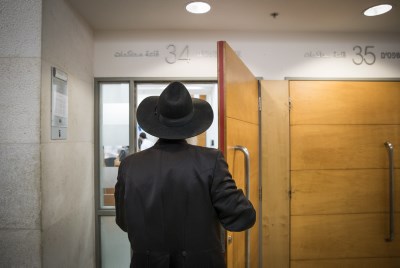
Israel Democracy Institute Scholars on the Proposal to Enable Religious Courts to Arbitrate on Civil Matters: ‘A Good and Balanced Proposal’
Ahead of today’s vote on a bill that would enable religious courts to conduct arbitration with the agreement of both parties, similar to the arbitration that takes place in other frameworks, a policy statement was sent to the Ministerial Committee on Legislation by Israel Democracy Institute’s Dr. Benny Porat.


